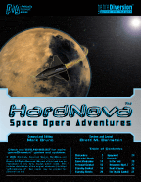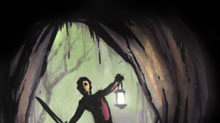by Demian Katz
 Hardnova: Space Opera Adventures
Hardnova: Space Opera Adventures
Concept and editing by Mark Bruno
System and layout by Brett M. Bernstein
Published by Politically Incorrect Games
34 page PDF
$4
At the end of my review of Armada
X, the first and last in the OneShot line of mini-RPGs released
by the late ThreeSixty Publishing, I expressed an interest in seeing
what Mark Bruno would do next. With the release of Hardnova: Space
Opera Adventures, the first of Politically Incorrect Games'
genreDiversion Quick Fix Games, my curiosity has been satisfied.
Hardnova is basically the reincarnation of Armada X. Although it has
dropped its predecessor's "Revolutionary War in space!" theme in favor
of leaving things more open and generic, it has carried over many
broader concepts such as character creation options and equipment
available, and it's still a cinematic game. This means Hardnova, like Armada X, is designed to be played quickly
and with little preparation as a change of pace for a somewhat
experienced gaming group. The fact that Armada X doesn't seem to be
available for sale anymore reinforces the feeling that this is meant to
replace it entirely. Although Armada X did have a few merits (mainly
its somewhat unusual setting and its novel core game mechanic), Hardnova is
definitely an overall improvement.
The first twenty-four pages of Hardnova are devoted to describing the
genreDiversion game system. I've seen an awful lot of fast-play
role-playing systems over the past couple of years, and there's really
nothing to make this one stand out from a mechanical perspective.
Characters may be created using either a point-based or a random system.
They have four primary traits (Fitness, Empathy, Reasoning and
Willpower) and can pick various skills which relate to these traits.
Optionally, backgrounds may be chosen which offer special modifiers or
powers (most notably psionics). The basic game mechanic involves
rolling two six-sided dice and comparing the results to the sum of the
values of the relevant trait and skill. Optional rules are included for
applying difficulty modifiers and for measuring margins of success.
Opposed rolls are resolved by comparing success margins, and combat
(man-to-man or ship-to-ship) is handled in a turn-based fashion and (not
surprisingly) uses the basic game mechanic.
It's all very familiar, and the dryly-written rules make for rather dull
reading, especially if you've seen this sort of thing before. Still,
the game deserves a lot of credit for being easy to pick up and play; if
you ignore the advanced rules and manage to wrap your brain around one
pointlessly overcomplicated rule determining how many skills you can
choose per trait, it's extremely simple to learn. Print-and-use sheets are provided for various character
archetypes and spaceships in case you don't have time to create them
yourself. More than any other mini-RPG I've encountered, this game has
all the details laid out and ready to be used; even the scenarios
include full stats for important NPCs and enemy types. I've always been
frustrated by the way that games of this type say they're ready to play
but then require the GM to come up with enemy stats on the fly; the fact
that Hardnova addresses that issue earns it a lot of credit in my book. Of course, if you want advanced rules, they're there, and they work perfectly well.
The last ten pages of the book contain four scenarios: three at two
pages each and one four-pager. As I noted, these include all of the
stats a GM could need for play, and they're quite easy to run.
Unfortunately, though, they're not all that interesting. Each one
revolves around a set of familiar clichés (mad scientists, insectoid
monsters, etc.) without straying into unusual territory, and the writing
remains as dry as in the rules. There aren't any especially interesting
puzzles to solve or distinctive characters to encounter. Most of the
excitement seems likely to come from action sequences: ship-to-ship
battles, races through claustrophobic settings and show-downs with
criminals in their lairs. This is nothing new for a mini-RPG, and it's
not necessarily a fatal flaw; by keeping the scenarios simple and
action-oriented, the game makes them easier to run without preparation.
Still, a GM whose players are inclined to take a more cerebral approach
may have to do some extra preparation to make these adventures
worthwhile, and it might not really be worth the effort compared to
simply devising entirely original adventures.
The last thing worth discussing is the game's presentation. The book's
two-column, illustration-free layout is functional and attractive, but I
think it could have been designed with more consideration for the fact
that most players will be making printouts. The cover is almost all
black, and the character sheets (of which there are many due to the
pre-generated character archetypes and spaceships) have dark
backgrounds. While this helps to convey the vastness of space, it also
wastes a lot of ink or toner unnecessarily. I was also a little
disappointed by the number of typos I found in the review copy that was
sent to me. Fortunately, this disappointment was more than made up for
when the list of suggested corrections I sent in were acted upon in less
than twenty-four hours. I'm impressed with Politically Incorrect Games'
devotion to improving their products, and I suspect that they'll be more
careful in future.
In the end, whether or not Hardnova is worth buying depends on a
number of factors. If you want a cinematic science fiction role-playing
game that's ready to play "out of the box" in minimal time, and you
don't mind that most of the thrills will come from action sequences
enhanced by GM creativity, it's worth the four bucks. On the other
hand, if you already have a copy of Deep7's Star Legion (or something
similar), your needs have probably already been met. If you're not so
interested in science fiction, you're best off waiting. There are quite
a few genreDiversion titles currently in the works, and I look forward
to seeing how they turn out. Although the lack of shining originality
here renders this only an average product, I see enough potential in the
ready-to-run presentation and straightforward system to feel that
there's a good chance the product line will turn out something memorable
eventually. The second title, Ghost Stories, is already out, and I will
be examining it shortly. Stay tuned!




